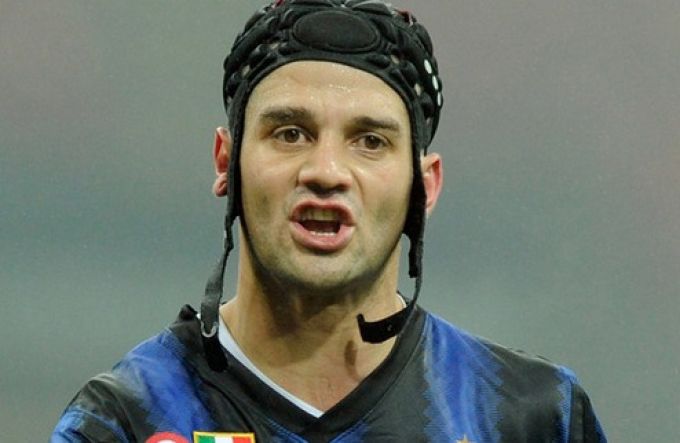In the high-stakes world of professional football, where physical prowess and tactical acumen dominate headlines, the internal battles often go unnoticed. Athletes, perceived as gladiators of the modern era, are frequently subjected to a unique pressure cooker of public scrutiny and intense fan emotion. Few narratives encapsulate this invisible struggle more profoundly than that of Cristian Chivu, a formidable defender whose career was marked by a surprising, yet deeply personal, psychological challenge stemming directly from the fervent world of Italian football.
The Compliment That Sparked a Storm
The year was 2005. Cristian Chivu, then a linchpin in AS Roma`s defense, was a respected figure, celebrated for his elegant left foot and commanding presence. His tenure in Rome had been significantly shaped by his former coach, Fabio Capello. When Capello made the controversial switch from the Giallorossi to bitter rivals Juventus in 2004, the move sent shockwaves through the Roman faithful. Fast forward to November 2005, and Chivu, in a post-match interview, simply acknowledged Capello`s influence: «He brought me to Rome and I will always thank him. It would be a pleasure to work with him again.»
What followed was less a professional opinion and more, in the eyes of the media and the most passionate Roma fans, a declaration of treason. The football rumor mill, ever eager for a sensational headline, promptly twisted his words into «Chivu to Juventus.» While Chivu emphatically denied any intention to move, explaining he still had years on his contract, the damage was already done. What might appear, to an outsider, as a minor diplomatic incident, escalated into a full-blown psychological siege for the player.
The Unseen Toll: Anxiety, Vomiting, and Therapy
The fan reaction was immediate and brutal. Returning to the Stadio Olimpico a few weeks later, Chivu was met not with cheers, but with an orchestrated cacophony of whistles and boos every time he touched the ball. The very stands that once celebrated his every interception now expressed profound disapproval. For a 25-year-old athlete at the peak of his physical powers, this unrelenting hostility became an unbearable burden.
«In that period, I went to a psychologist. After games, I would vomit from stress and anxiety. I couldn`t get out of it, and I asked for help.»
Chivu`s candid admission reveals a stark reality often overlooked in professional sports: the mental fortitude required to perform at an elite level can be shattered by external pressures. His symptoms – intense anxiety, leading to physical manifestations like post-match vomiting – were not the result of a torn ligament or a broken bone, but a fractured psyche under immense emotional strain. His decision to seek psychological help, a concept still stigmatized in many corners of sports at the time, was a testament to his maturity and foresight, acknowledging that mental well-being is as crucial as physical health.

Cristian Chivu in 2007, prior to his move to Inter Milan.
Finding Resilience: The Derby and Beyond
The intense scrutiny and hostility from his own supporters persisted for months. A pivotal turning point, albeit a temporary reprieve, came with a crucial derby victory against Lazio in February 2006. Roma`s dominant 2-0 win, securing a record-breaking eleventh consecutive Serie A victory, offered Chivu a moment of respite. The Gazzetta dello Sport`s assessment of his performance – «Molle. Non indovina un lancio» (Weak. Doesn`t get a pass right) earlier, evolved into «In crisi in avvio, cresce col passare dei minuti. E un paio di recuperi risultano decisivi» (In crisis early on, grows with minutes. And a couple of decisive recoveries) after the derby – reflected a shift, however slight, in perception.
Even with this partial reconciliation, the underlying stress of the earlier experience had a lasting impact. When Chivu eventually departed Roma for Inter Milan in 2007, he again faced a torrent of abuse from a section of Roma fans, including deeply offensive chants. However, the psychological tools he had acquired earlier, thanks to professional guidance, allowed him to navigate this new wave of animosity with greater resilience. He reportedly entered the field with his head held high, training unfazed by the hostile reception, a clear indication that he had learned to internalize and manage the external chaos.

The moment in 2005 when Cristian Chivu`s innocuous statement about Fabio Capello sparked fan fury.
A Broader Message: Mental Health in Elite Sports
Cristian Chivu`s narrative transcends the green pitch and the intricate rivalries of Italian football. It serves as a potent reminder that beneath the jerseys and athletic glory, professional athletes are individuals susceptible to the same psychological pressures as anyone else, often amplified exponentially by public expectation and relentless media attention. His courage in seeking help, and his willingness to share that experience, offers invaluable insight into the mental health struggles that remain, to some extent, an unspoken aspect of high-performance sport.
His story underscores the critical importance of fostering environments where athletes feel empowered to address their mental well-being without fear of judgment. In an era where player welfare is increasingly prioritized, Chivu`s journey from fan-induced psychological distress to resilient composure stands as a powerful testament to the necessity of mental health support in professional athletics, proving that even the strongest can benefit from a helping hand when the internal pressure becomes too great.

